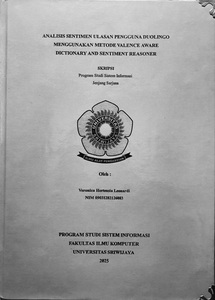LEONARDI, VERONICA HERTENSIA and Ibrahim, Ali (2025) ANALISIS SENTIMEN ULASAN PENGGUNA DUOLINGO MENGGUNAKAN METODE VALENCE AWARE DICTIONARY AND SENTIMENT REASONER. Undergraduate thesis, Sriwijaya University.
![[thumbnail of RAMA_057201_09031282126083_cover.jpg]](http://repository.unsri.ac.id/177518/1.hassmallThumbnailVersion/RAMA_057201_09031282126083_cover.jpg)  Preview |
Image
RAMA_057201_09031282126083_cover.jpg - Cover Image Available under License Creative Commons Public Domain Dedication. Download (1MB) | Preview |
|
Text
RAMA_057201_09031282126083.pdf - Accepted Version Restricted to Repository staff only Available under License Creative Commons Public Domain Dedication. Download (5MB) | Request a copy |
|
|
Text
RAMA_57201_09031282126083_TURNITIN.pdf - Accepted Version Restricted to Repository staff only Available under License Creative Commons Public Domain Dedication. Download (3MB) | Request a copy |
|
|
Text
RAMA_57201_09031282126083_0021078402_01_front_ref.pdf - Accepted Version Available under License Creative Commons Public Domain Dedication. Download (2MB) |
|
|
Text
RAMA_57201_09031282126083_0021078402_02.pdf - Accepted Version Restricted to Repository staff only Available under License Creative Commons Public Domain Dedication. Download (346kB) | Request a copy |
|
|
Text
RAMA_57201_09031282126083_0021078402_03.pdf - Accepted Version Restricted to Repository staff only Available under License Creative Commons Public Domain Dedication. Download (332kB) | Request a copy |
|
|
Text
RAMA_57201_09031282126083_0021078402_04.pdf - Accepted Version Restricted to Repository staff only Available under License Creative Commons Public Domain Dedication. Download (900kB) | Request a copy |
|
|
Text
RAMA_57201_09031282126083_0021078402_05.pdf - Accepted Version Restricted to Repository staff only Available under License Creative Commons Public Domain Dedication. Download (208kB) | Request a copy |
|
|
Text
RAMA_57201_09031282126083_0021078402_06_ref.pdf - Bibliography Restricted to Repository staff only Available under License Creative Commons Public Domain Dedication. Download (213kB) | Request a copy |
|
|
Text
RAMA_57201_09031282126083_0021078402_07_lamp.pdf - Accepted Version Restricted to Repository staff only Available under License Creative Commons Public Domain Dedication. Download (2MB) | Request a copy |
Abstract
Current technological developments have made it easier to learn languages through applications such as Duolingo. This study aims to understand users' perceptions of Duolingo using VADER (Valence Aware Dictionary and Sentiment Reasoner)-based sentiment analysis. User reviews from the Google Play Store were processed using Google Collaboratory, resulting in 1,831 data points that were grouped as neutral, negative, and positive. The analysis results show an overall accuracy of 98 percent. The model is effective in identifying neutral sentiment (precision 100 percent, recall 97 percent, F1-score 99 percent) and positive sentiment (precision 99 percent, recall 82 percent, F1-score 99 percent). However, the model is less effective in detecting negative emotions, with an F1-score of 74 percent, recall of 82 percent, and precision of 67 percent, indicating misclassification of some negative emotions. The word cloud shows positive words such as “good,” “helpful,” and “fun,” as well as negative words such as “technical problems” and “learning limitations.” Challenges in using VADER include its inability to handle complex language contexts and deep emotional nuances. To improve sentiment classification, this study recommends using VADER in conjunction with Deep-Translator. This combination can help identify negative sentiments more effectively and handle data in multiple languages more efficiently. The objective of this research is to understand user perspectives and improve sentiment analysis accuracy, thereby contributing to the development of better language learning applications. Keywords : Sentiment Analysis, Deep-Translator, Duolingo, Google Collaboratory, VADER
| Item Type: | Thesis (Undergraduate) |
|---|---|
| Uncontrolled Keywords: | Analisis Sentimen, VADER, Duolingo |
| Subjects: | T Technology > TK Electrical engineering. Electronics Nuclear engineering > TK7885-7895 Computer engineering. Computer hardware |
| Divisions: | 09-Faculty of Computer Science > 57201-Information Systems (S1) |
| Depositing User: | Veronica Hertensia Leonardi |
| Date Deposited: | 10 Jul 2025 03:24 |
| Last Modified: | 10 Jul 2025 03:24 |
| URI: | http://repository.unsri.ac.id/id/eprint/177518 |
Actions (login required)
 |
View Item |
